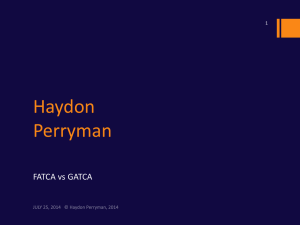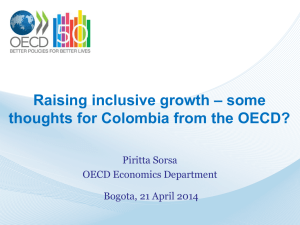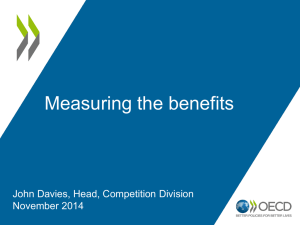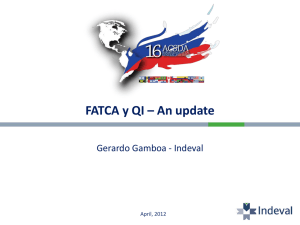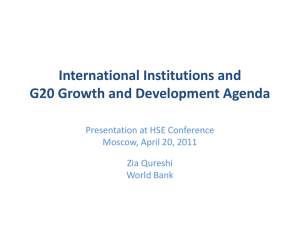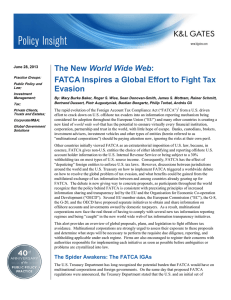Work on automatic exchange
advertisement
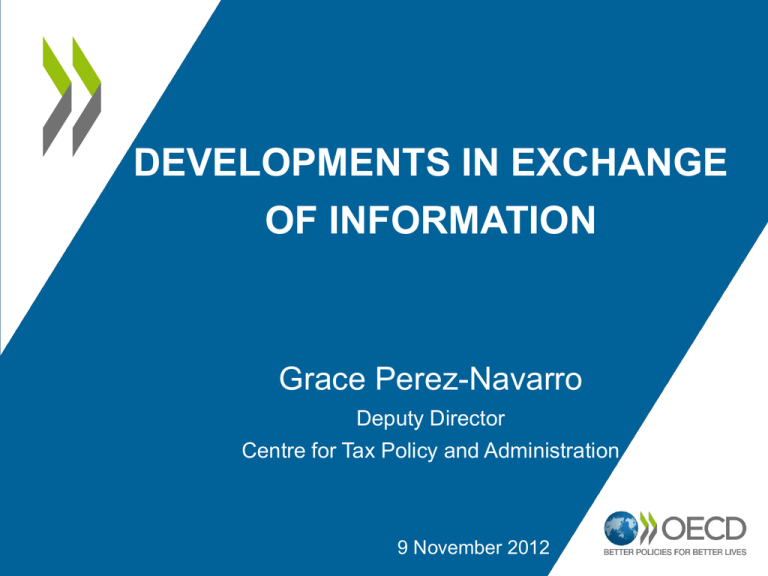
DEVELOPMENTS IN EXCHANGE OF INFORMATION Grace Perez-Navarro Deputy Director Centre for Tax Policy and Administration 9 November 2012 INFORMATION EXCHANGE ON REQUEST: WORK ON ARTICLE 26 Centre for Tax Policy and Administration 2 Why Update Article 26 and its Commentary? • Regular reviews and updates are required to take into account recent developments and to reflect current country practices: 2005 update: Addition of paragraphs 4 and 5 to clarify that a request cannot be denied on the basis of domestic tax interest or bank secrecy 2012 update: Released by OECD on 18 July 2012 • Consensus of all members, no reservations or observations • Updated Article 26 and its commentary can be found on the OECD website: http://www.oecd.org/ctp/exchangeofinformation/latestdocuments/120718 _Article%2026-ENG_no%20cover%20(2).pdf 2012 Update: Highlights • Change to the text of Article 26 – Article 26(2) was amended to allow information received for tax purposes to be used for non-tax purposes provided: • Such use is allowed under the laws of both States and • The competent authority of the supplying State authorizes such use – Supports a “whole of government” approach and is directly linked with the OECD’s work in connection with the “Oslo Dialogue” 2012 Update: Highlights • Clarifications to the Commentary – Language describing the application of Article 26 to a group of taxpayers – Clarifications on the meaning of “foreseeably relevant” and “fishing expeditions” – Optional language providing for default standard time limits Group Requests • Standard of “foreseeable relevance” can be met for a group of taxpayers that are not individually identified • 3 requirements: 1. Detailed description of group and facts and circumstances that led eto request; 2. Explanation of applicable law and why there is reason to believe that the taxpayers in the group have been non-compliant with that law supported by a clear factual basis 3. A showing that the requested information would assist in determining compliance by the taxpayers in the group • Usually, although not necessarily, a third party will have actively contributed to the non-compliance of the taxpayers in the group Default Standard Time Limits • Optional language set out in paragraph 10.4 of the Commentary – Default 2 months/6 months to provide information but competent authorities may agree to different periods – Exchange still in accordance with Article 26 if the information is provided after the time limits WORK ON AUTOMATIC EXCHANGE Centre for Tax Policy and Administration 8 From on request to automatic exchange? The international standard is exchange of information on request, BUT there is growing interest to engage in automatic exchange of information. Centre for Tax Policy and Administration 9 G20 (Mexico, 2012) • G20 Ministerial, 26 February 2012: “We call for an interim report and update by the OECD on necessary steps to improve comprehensive information exchange, including automatic exchange of information and, together with the FATF, on steps taken to prevent the misuse of corporate vehicles and improve interagency cooperation in the fight against illicit activities.” • G20 Leaders Declaration, 19 June 2012: “… We welcome the OECD report on the practice of automatic information exchange, where we will continue to lead by example in implementing this practice. We call on countries to join this growing practice as appropriate and strongly encourage all jurisdictions to sign the Multilateral Convention on Mutual Administrative Assistance.…” Centre for Tax Policy and Administration 10 G20 (Russia 2013) G20 Ministerial (19 April 2013) • 14. “….In view of the next G20 Summit, we also strongly encourage all jurisdictions to sign or express interest in signing the Multilateral Convention on Mutual Administrative Assistance in Tax Matters and call on the OECD to report on progress. We welcome progress made towards automatic exchange of information which is expected to be the standard and urge all jurisdictions to move towards exchanging information automatically with their treaty partners, as appropriate. We look forward to the OECD working with G20 countries to report back on the progress in developing of a new multilateral standard on automatic exchange of information, taking into account country-specific characteristics. The Global Forum will be in charge of monitoring.” Centre for Tax Policy and Administration 11 The Influence of FATCA (1) • A key catalyst for automatic exchange of information has been the FATCA legislation enacted by the United States in 2010. • FATCA effectively requires foreign financial institutions around the globe to report account details of their U.S. customers to the U.S. tax administration. • Recognising the important legal and cost issues of this approach, the US developed together with five other countries (France, Germany, Italy, Spain and the United Kingdom) a model for the intergovernmental implementation of FATCA (Model FATCA IGA). • The Model FATCA IGA provides for the implementation of FATCA through reporting by financial institutions to their local tax authorities, which then exchange the information on an automatic basis with the U.S. tax authorities. Centre for Tax Policy and Administration 12 The Influence of FATCA (2) • The Model FATCA IGA is not only becoming a preferred route for the implementation of FATCA, it can also serve as a template for a common model for automatic exchange of information. • The Model FATCA IGA itself contains a commitment to work with interested countries, the OECD and where appropriate the EU on adapting the terms of the Model FATCA IGA “in the medium term to a common model for automatic exchange of information, including the development of reporting and due diligence standards.” Centre for Tax Policy and Administration 13 The Influence of FATCA (3) • 9 April 2013, the Ministers of the same five members that developed the FATCA intergovernmental agreements with the US announced their intention to exchange FATCA type information amongst themselves, in addition to exchanging information with the United States. • 13 April 2013, Belgium, the Czech Republic, the Netherlands, Poland, and Romania also expressed interest in joining this approach. • 6 April 2013, Luxembourg indicated a willingness to provide bank information automatically to other EU member countries (within the scope of the EU Savings Directive) and Austria is also considering. Centre for Tax Policy and Administration 14 EU and Automatic Exchange • Within the European Union member states exchange information automatically on interest income within the meaning of the Savings Directive. Only Luxembourg and Austria still levy a withholding tax instead of exchanging information during a transitional period. There is also an amending proposal to the Directive which however has not yet been adopted. • The revised Directive on Administrative Cooperation in the Field of Taxation introduces automatic exchange of information from 1 January 2015 on five categories of income and capital based on available information (income from employment, director's fees, life insurance products not covered by other Directives, pensions, ownership of and income from immovable property). Centre for Tax Policy and Administration 15 Work on automatic exchange • The OECD has been active in facilitating automatic exchange for the past 20 years – Created legal framework, developed technical standard on format (STF) [which was used by EU to develop FISC 153], developed guidance, provides training, etc. – 1997 TIN recommendation • OECD Report published on 24 July 2012: “Automatic Exchange of Information: What it is, How it works, Benefits, What remains to be done” http://www.oecd.org/ctp/exchangeofinformation/AEOI_FINAL_with%20cover_WEB.pdf Centre for Tax Policy and Administration 16 Work on automatic exchange – Legal basis • Exchange of information provision of a double taxation convention based on Article 26 of the OECD or UN Model Convention, • Article 6 of the Convention on Mutual Administrative Assistance in Tax Matters, or • For EU member countries, domestic laws implementing EU directives which provide for automatic exchange. 17 Work on automatic exchange – The End-to-End Process: Sending Country 18 Work on automatic exchange – The End-to-End Process: Receiving Country 19 Work on automatic exchange – What does the work on automatic exchange show? • Widespread use both within Europe and outside • Effective compliance tool, for example it can: – Provide timely information on an investment return or the underlying capital sum – Help detect cases of non-compliance even where tax administrations have had no previous indications of noncompliance Centre for Tax Policy and Administration 20 Widespread use of automatic exchange Centre for Tax Policy and Administration 21 Work on automatic exchange – What still needs to be done? • 8 Key components in successful automatic exchange From the perspective of the receiving country: 1. What – Defining scope of income / transactions to cover. 2. Who – Defining the information to capture regarding the taxpayer / beneficial owner. 3. Quality – Ensuring data quality; e.g. data validation, TIN verification, general due diligence standards. 4. When – When to receive the information. 5. How to exchange – The format to use, encryption and transmission system. 6. How to use – Risk assessment, matching, compliance action. Centre for Tax Policy and Administration 22 Work on automatic exchange – What still needs to be done? • 8 Key components in successful automatic exchange From the perspective of the sending country: 7. Confidentiality – Keeping information protected both in law and in practice. 8. Reciprocity, acknowledgement and feedback. Centre for Tax Policy and Administration 23 Current OECD work • As automatic exchange of information becomes a growing practice, and with the G20 support for a multilateral implementation in this domain, the OECD has redoubled its efforts to address the remaining challenges and to offer, to all interested countries, a standardized, secure and effective system of automatic information exchange. • Working with partner countries (including Argentina, Brazil, China, India, the Russian Federation and South Africa), the OECD is advancing rapidly in the development of a common model for reporting and automatic exchange of certain account information held by financial institutions, including due diligence rules, reporting formats and secure transmission methods. The goal of this work is to maximise compliance benefits for residence countries, reduce costs for financial institutions and provide all necessary safeguards through the development of one standard than a proliferation of different ones). Centre for(rather Tax Policy and Administration 24 Current OECD work • The goal of this work is to maximise compliance benefits for residence countries, reduce costs for financial institutions and provide all necessary safeguards through the development of one standard (rather than a proliferation of different ones). Centre for Tax Policy and Administration 25 Want to know more? For more information: www.oecd.org/ctp/exchange-of-taxinformation/automaticexchangeofinforma tionreport.htm www.oecd.org/ctp/eoi/mutual Centre for Tax Policy and Administration 26



